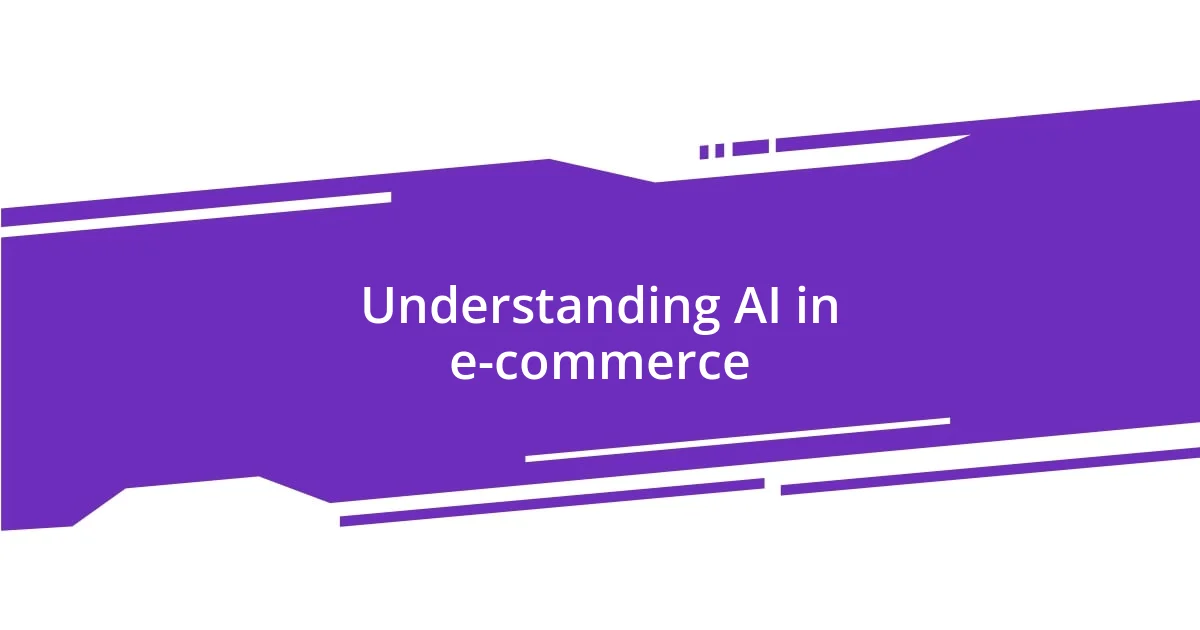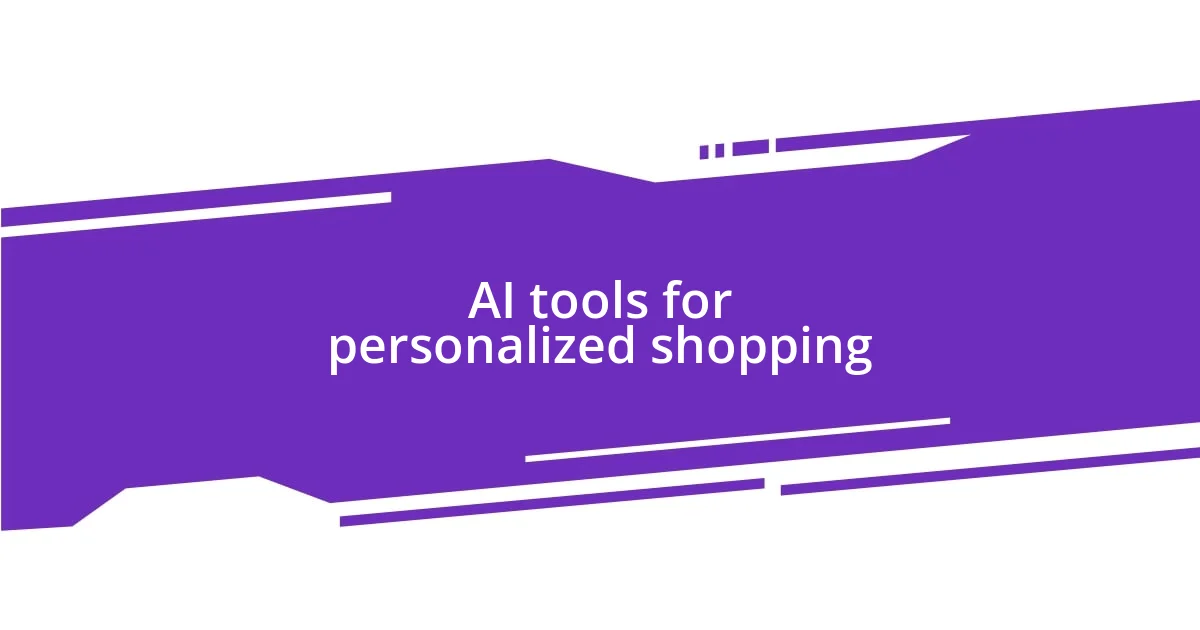Key takeaways:
- AI enhances the e-commerce experience through personalized recommendations, chatbots, and trend predictions, fostering a deeper connection between businesses and customers.
- Key benefits of AI for retailers include streamlined inventory management, personalized marketing strategies, and dynamic price optimization, leading to increased customer loyalty and sales.
- Successful AI implementation requires a clear understanding of business needs, continuous learning and adaptation, and fostering a technology-embracing culture among team members.

Understanding AI in e-commerce
When I first started exploring AI in e-commerce, I was struck by how it transforms the shopping experience. Imagine the delight of a customer when an online store instantly recommends products that match their tastes—it’s like having a personal shopper at their fingertips. This technology analyzes user data and behavior patterns, providing insights that help businesses cater specifically to individual preferences.
I often reflect on the role of chatbots in enhancing customer service. Just the other day, I was engaging with a chatbot while browsing shoes online, and it felt surprisingly human. It understood my queries and guided me effortlessly through my choices. Have you ever had a similar experience? It’s fascinating how these AI tools not only improve efficiency but also build a more personalized connection between businesses and consumers.
Moreover, AI can predict trends with remarkable accuracy. I remember discussing this with a friend who owns an online retail store. He shared how he utilized AI analytics to anticipate customer needs before they even knew what they wanted. It’s a powerful testament to how AI isn’t just a trendy buzzword—it’s fundamentally reshaping how businesses strategize and interact with their clientele.

Benefits of AI for retailers
The advantages of AI for retailers are truly transformative. For instance, automation of inventory management has made a considerable difference in my own experiences with online retailers. When I order something and receive an immediate update on stock levels or anticipated shipping times, it shows how AI streamlines the entire supply chain, making my shopping experience smooth and worry-free.
Another key benefit I’ve observed is the enhancement of personalized marketing strategies. I recall a time when I received a tailored email from a retailer based on my past purchases. It felt like they understood my style and preferences deeply. This connection fosters loyalty; when customers feel seen and valued, they’re more likely to return.
Additionally, AI can significantly increase sales through price optimization. A retailer I follow closely recently shared insights about using algorithms to adjust their prices based on demand, competition, and seasonal trends. When prices reflect real-time data, it not only benefits the retailer’s bottom line but also offers customers competitive pricing, making shopping both satisfying and cost-effective.
| Benefit | Description |
|---|---|
| Inventory Management | AI streamlines inventory processes, providing accurate stock updates which enhance customer experience. |
| Personalized Marketing | Retailers use AI to create tailored marketing strategies, fostering customer loyalty through personalized communication. |
| Price Optimization | AI analyzes data to adjust prices dynamically, ensuring competitiveness while maximizing sales. |

AI tools for personalized shopping
I’ve come to appreciate AI tools that personalize the shopping experience in ways that feel almost magical. A few weeks ago, I browsed an online store and was surprised when it suggested items I hadn’t even thought of but ended up loving. This capability relies on sophisticated algorithms that draw from my browsing history, preferences, and even the behavior of similar customers. It’s as if the technology is whispering, “Hey, I know what you’ll love next!”
Here are some standout AI tools that enhance personalized shopping:
- Recommendation Engines: Platforms like Amazon use these to analyze past purchases and suggest relevant products, creating a tailored shopping journey.
- Chatbots: I’ve often interacted with intelligent chatbots that offer product suggestions based on my inquiries, making the shopping process feel more engaging and less robotic.
- Dynamic Pricing: Some retailers adjust prices based on my browsing habits. I once saw a product grow cheaper after I hesitated on a purchase, which felt like a nudge to complete my transaction.
- Visual Search Tools: Apps using AI allow me to upload a photo of an item, leading to instant product suggestions that match or complement what I’m looking at.
- Personalized Marketing Campaigns: One day, I received a special discount offer that felt tailored to my taste; it was a reminder that AI is making brands more attuned to customer desires.
These tools not only enhance the shopping experience but also create a sense of connection, making me feel valued as a customer rather than just a transaction. It’s this level of customization that keeps me returning to brands that truly understand my preferences.

Enhancing customer service with AI
When it comes to customer service, I’ve noticed that AI-driven chatbots have completely changed the way I interact with brands. Just last week, I had a question about my order status, and I was pleasantly surprised when a chatbot not only provided instant answers but even made suggestions for related products based on my previous purchases. It felt less like a generic response and more like a helpful friend guiding me through my shopping journey.
Moreover, AI can analyze customer feedback and sentiment at an astonishing scale. I remember reading a report from a retailer that used AI to sift through thousands of online reviews, quickly identifying common concerns and areas for improvement. This proactive approach made me feel valued as a customer, as I could see the brand responding to genuine feedback, which, in turn, enhanced my loyalty and trust.
I often wonder how brands manage to know when I want assistance without me even asking. AI technology has enabled predictive service, where systems anticipate customer needs based on past interactions. A recent experience illustrated this perfectly: I was about to exit a site when a pop-up appeared offering help – it made me rethink my hesitation, turning what could have been a lost sale into a satisfying transaction. It’s a small touch, but it demonstrates how AI not only enhances customer service but creates a more seamless shopping experience.

Optimizing inventory management with AI
I’ve found that AI in inventory management can be a game changer for retailers looking to streamline their operations. Just the other day, I came across a small online store that implemented an AI-based system to predict stock levels based on historical data and seasonal trends. It was impressive to see how they managed to avoid stockouts, which I know as a shopper can be incredibly frustrating. I’d much rather see availability than hear, “Sorry, that item is out of stock,” especially after I’ve invested time in finding the perfect product.
Moreover, inventory optimization through AI allows for smarter purchasing decisions. I can recall a time when I was shopping for winter clothing, and I noticed that a brand had an AI tool that adjusted their stock levels dynamically based on sales forecasts. They seemed to understand when to ramp up stock for popular items, which kept me engaged and excited about the various options. It made me wonder: how many more brands could benefit from similar technology to satisfy their customers without overwhelming their warehouses?
Lastly, the role of AI in inventory management isn’t just about minimizing waste; it’s about enhancing the overall shopping experience. From what I’ve seen, retailers utilizing AI can offer quicker fulfillment times, which in turn boosts my satisfaction as a customer. I remember feeling thrilled when an order I placed on a site boasting AI inventory management arrived days earlier than expected. It’s that kind of efficiency that builds trust and loyalty with shoppers like me. How could any brand overlook the emotional impact of timely deliveries in this competitive landscape?

Strategies for implementing AI successfully
In my experience, one of the most effective strategies for implementing AI in e-commerce is starting with a clear understanding of your specific needs. I remember a conversation with a friend who runs a small business; she initially jumped in without a plan and struggled to see results. However, when she took the time to assess her customer pain points, like delayed responses or poor product recommendations, she was able to select AI tools that directly addressed those issues. It’s a reminder that aligning technology with business objectives can significantly enhance outcomes.
Another insightful approach is to commit to continuous learning and iteration. I’ve seen businesses thrive when they treat AI as an evolving journey rather than a one-off solution. Recently, I was browsing a website that had implemented an AI feature for personalized recommendations. Over a few weeks, I noticed that the suggestions kept getting better because they adapted to my shifting tastes. It made me think: how often do we embrace the learning curve with AI? Staying flexible and being open to adjustments can lead to unprecedented growth and satisfaction.
Lastly, fostering a culture that embraces technology is crucial. I recall joining a webinar where experts discussed the importance of involving your team in the AI adoption process. Hearing them explain how training staff not only alleviates fears but also opens the door to innovation struck a chord with me. If your team feels invested and knowledgeable about the AI tools in play, it creates an environment where creativity flourishes. What if every employee viewed AI as their ally? This kind of synergy might just transform the way customers experience e-commerce.














